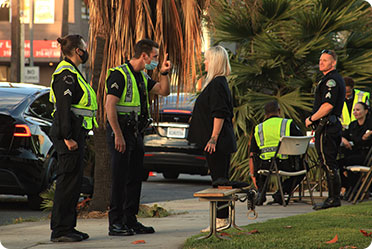
Unpacking New Realities
In recent years, drugged driving in New Jersey has become increasingly common. Since the legalization of marijuana for adults 21 and over, we’ve seen a spike in cases involving cannabis. But these aren’t limited exclusively to marijuana. Prescription medications, opiates, heroin, and other substances also frequently come into play.
More often now, I’m seeing cases where a driver has a small amount of alcohol in their system—well below the legal limit—but is also suspected of having used marijuana. The combination raises red flags for police, even if each substance on its own wouldn’t necessarily trigger an arrest.
When a police officer conducts a traffic stop, they’re trained to look for signs of alcohol use first, most notably, the smell of alcohol. If they suspect intoxication, they’ll usually move forward with standardized field sobriety tests.
But here’s the issue: those field tests were designed for alcohol, not drugs. They were created to help determine whether a driver’s blood alcohol content (BAC) is at or above 0.08%. These tests don’t measure whether someone is impaired due to marijuana, prescription medication, or other substances. In fact, they were never intended to assess whether a person is unsafe to drive at all. They’re merely indicators of overconsumption of alcohol.
Despite this, field sobriety tests are often misrepresented in court. Prosecutors use them to imply general impairment, and many defense attorneys fail to challenge that interpretation. This leads to unfair assumptions, especially in drug-related cases.
Unlike alcohol, which has a clear per se legal limit of 0.08% BAC, New Jersey has no defined threshold for drug impairment. There’s no legal guideline stating how much of a particular drug, whether THC, opioids, or anything else, renders a person legally intoxicated.
Police may rely on blood or urine tests to detect drug presence, but these tests alone don’t prove impairment. And that presents a huge legal challenge because the state must link observed signs of impairment to a specific drug in the driver’s system.
Complicating this further, many officers are not adequately trained to recognize symptoms of drug impairment. For instance, they may be unfamiliar with how someone under the influence of methamphetamine or inhalants presents compared to someone on alcohol. As a result, misjudgments abound.
Tolerance And Prescription Drugs
One major difference between alcohol and drugs is individual tolerance. Alcohol affects most people in relatively predictable ways, which is why lawmakers feel confident enforcing a universal legal limit.
Drugs, on the other hand, are far more personal. A medication that impairs one person might have no effect on another who’s been taking it for months.
Many prescription drugs come with warnings to avoid driving initially, but after a period of adjustment, those same drugs may no longer impair performance. And in many cases, these medications are used to treat impairments like anxiety or chronic pain, not cause them. This variability makes it far more difficult for the law to define impairment consistently across the board.
Yet another layer of complexity comes from how drugs interact with another. If someone takes two medications, they may interact unpredictably with dramatically amplified effects.
But the kicker is that under New Jersey law, it’s the driver’s responsibility to understand how these substances might affect them. Even if the reaction was unintentional or unknown, that doesn’t automatically excuse the behavior.
Courts have ruled in the past that ignorance isn’t a valid defense, particularly in well-known instances that involve popular drugs like Ambien, where sleep-driving was once considered a plausible defense but no longer is.
How The State Builds Drug-Related DWI Cases
The state must meet a specific burden of proof to convict someone of a drug-related DWI. They need to show:
- Observable signs of impairment, be it slurred speech, poor coordination, confusion, or the inability to follow basic instructions.
- Chemical evidence of drugs in the system, usually from a urine or blood test.
- A connection between impairment and the drug.
It’s not enough for the state to show that a person had a drug in their system and also seemed impaired. It must demonstrate that the impairment was caused by the drug and that the drug fits one of the categories outlined in the law: narcotic, hallucinogenic, or habit-forming.
A recent case, State v. Olenowski, reaffirmed this principle. The New Jersey Supreme Court ruled that prosecutors must prove a direct connection between the drug and the driver’s inability to operate the vehicle safely. This ruling strengthens the legal standard and underscores how critical it is for defense attorneys to scrutinize the prosecution’s evidence closely.
Still Have Questions? Ready To Get Started?
For more information on drugged driving in New Jersey, an initial consultation is your next best step. Get the information and legal answers you are seeking by calling (856) 429-2323 today.
